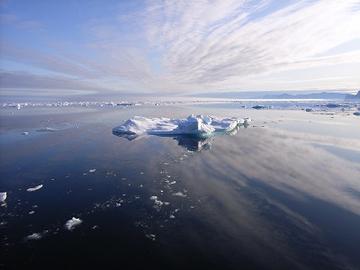St Cross Fellow Dr Helen Johnson, Associate Professor of Physical Oceanography at the Dept. of Earth Sciences, Oxford, has co-authored a new international study that has found that the Atlantic meridional overturning circulation, a deep-ocean process that plays a key role in regulating Earth’s climate, is primarily driven by cooling waters west of Europe.
Contrary to the prevailing scientific view that most of the overturning and variability occurs in the Labrador Sea off Canada, the study shows that most of this occurs in regions between Greenland and Scotland, where warm salty waters carried northward from the tropics sink and convert into colder, fresher deep waters moving south through the Irminger and Iceland basins.

Photo: Helen Johnson
Here, overturning variability was seven times greater than in the Labrador Sea, accounting for 88% of the total variance documented across the entire North Atlantic over the 21-month study period.
Helen Johnson and Professor of Physical Oceanography David Marshall participated in the study, led by Duke University in the United States and the National Oceanography Centre in the UK.
“The overturning circulation has a major impact on how the Atlantic sector responds to climate change” said Marshall. “Recent work at Oxford has shown that the high latitude North Atlantic is the most important region for understanding how the overturning responds to anthropogenic climate change”.
"Changes in the rate of overturning affect the transfer of heat to high latitudes and can impact on Arctic sea ice” added Johnson.
“These findings, unexpected as they may be, can help scientists better predict what changes might occur to the meridional overturning circulation and what the climate impacts of those changes will be”, said project lead Susan Lozier (Duke University, United States).
The paper, published on 1 February in Science, is the first from the £25 million, five-year initial phase of the OSNAP (Overturning in the Subpolar North Atlantic Program) research project, in which scientists have deployed moored instruments and sub-surface floats across the North Atlantic to measure the ocean’s overturning circulation and shed light on the factors that cause it to vary.
Primary funding came from the US National Science Foundation’s Physical Oceanography Program and the UK Natural Environment Research Council. Additional funding came from the European Union 7th Framework Programme and Horizon 2020.
CITATION: “A Sea Change in Our View of Overturning – First Results from the Overturning in the Subpolar North Atlantic Program"
DOI:10.1126/science.aau6592
Ella Bedrock
1 February 2019